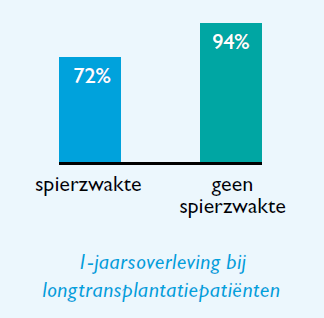How does a waiting list work?
Through Eurotransplant
Our hospital is affiliated with Eurotransplant, the organisation that coordinates transplantations.
When a donor is registered, Eurotransplant uses a complex computer program to find the best candidate for the available organ. Medically, it is essential that the donor and recipient characteristics match well. The selection criteria vary by organ.
The transplant coordinator contacts the pulmonologist, who in turn consults the transplant surgeon to determine whether the lungs can be accepted and transplanted. If both agree, you will be notified by phone.
Place on waiting list
Several criteria are used to match donors with patients on the waiting list.
The 2 most important ones are:
- blood group
- lung size (determined by lung function tests) and height of donor/recipient
If multiple patients match the blood group and lung size, the patient in the most critical condition is prioritised.
Each patient on the waiting list is given a code indicating how urgently a transplant is needed.
Stay reachable
When a donor match is found, you will be contacted by a member of the transplant team. You must come to the hospital as soon as possible (but without rushing) to begin preparation.
Ensure your contact details are always up to date and notify us of any changes.
Have a backup plan by consulting your health insurance provider about ambulance or taxi services in case your planned transport cannot take place.
Be aware that approximately 20–25% of transplants are cancelled due to the donor lungs not meeting the required criteria during on-site inspection.
Stay healthy while you wait
The underlying severe lung condition that requires a lung transplant makes staying “healthy” a significant challenge.
The healthier you are, the shorter your hospital stay and the better your outcomes after the transplant.
What can you do while waiting for a lung transplant?
Watch your weight
A healthy diet rich in protein contributes to maintaining good physical condition and supports the healing process after the transplant. A dietitian will assess your current nutritional status and determine whether any adjustments are needed.
Good nutritional status means that your body receives enough nutrients and you maintain an appropriate weight. It is important to avoid both overweight and underweight.
Reduce obesity
- Overweight or obese patients who lower their BMI by one point before the transplant reduce their risk of mortality by 15%.
- A lower BMI often results in a shorter stay in the intensive care unit after the transplant.
Join a rehabilitation programme
Rehabilitation improves muscle function both before and after the transplant. It reduces breathlessness, enhances muscle strength, and gives you more energy to carry out daily activities. It will help you stay as strong as possible while waiting for your transplant.
Your physiotherapist will develop a personalised exercise programme consisting of cycling and walking, combined with specific exercises to target certain muscle groups.

Reducing muscle weakness and improving physical fitness
- Weaker muscles increase the risk of medical complications and delay your recovery.
- Physically stronger patients achieve better outcomes after transplantation.
- Patients with greater muscle mass have a four times higher survival rate compared to those with low muscle mass and can also return home more quickly after the transplant.
Learn to manage your emotions
Waiting for a lung transplant can be difficult. It is normal to experience a range of emotions during this uncertain period. This uncertainty can be stressful and discouraging for both you and your loved ones.
Feelings such as fear, impatience, and even anger are normal. The brochure below contains tips and suggestions for managing these emotions.
You can always reach out to our specialised team for:
- education and information before, during, and after your transplant,
- assistance with financial matters,
- emotional support and guidance,
- the opportunity to meet other lung transplant patients who have already undergone the process and can provide encouragement and information,
- tools to remain as independent as possible and brochures on how to perform daily activities with less shortness of breath.
Bi-monthly check-up
During the waiting period, you'll need to see your pulmonologist every two months. It is important to keep to the scheduled appointments.
During these check-ups, your health condition will be evaluated, and changes to medication or additional tests may be required.
Suitable donor found?
If compatible donor lungs are found for you, you will be contacted as soon as possible by a member of the transplant team. This call can come at any time of the day, including at night.
Go to the hospital as soon as possible, but do not rush.
Always report to the emergency department first, even at night, and inform them that you have been called in for a lung transplant.
False alarm
Unfortunately, it can happen that the transplant is cancelled at the last moment, even if prior tests on the donor were satisfactory. This can lead to intense and mixed emotions for you and your family.
If you or a family member are struggling to cope with this situation, you can always contact a psychologist or social worker.
Any questions?
-
+32 16 34 68 02 - pneumology secretariat